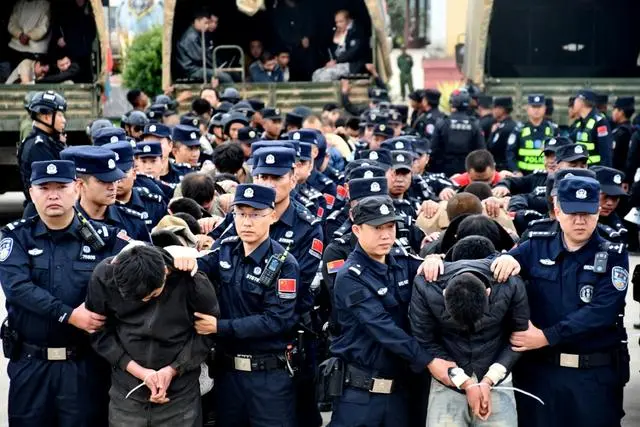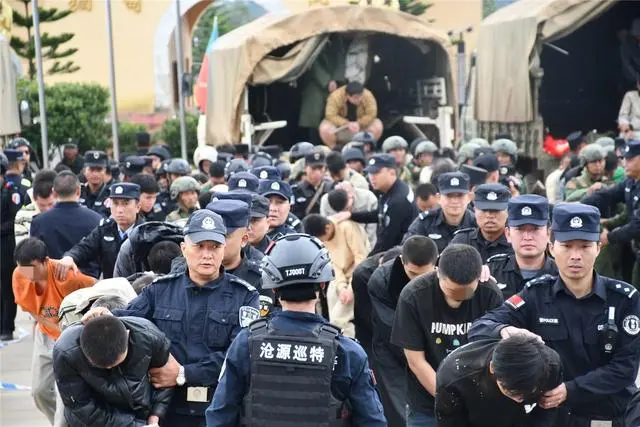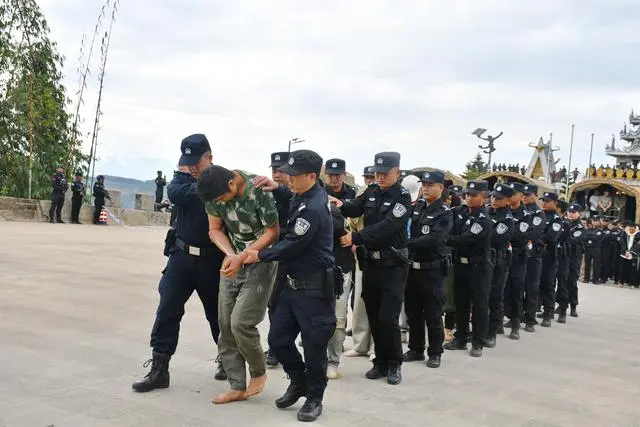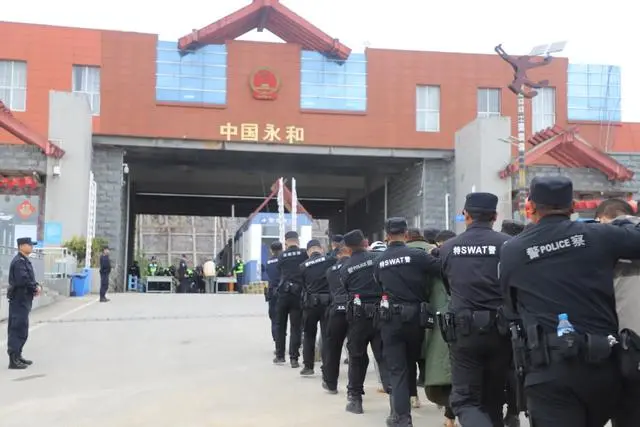长安街知事21日从公安部获悉,近日,公安部部署云南公安机关加强与缅甸相关地方执法部门的警务执法合作,首次在缅甸当阳地区抓获1079名实施跨境电信网络诈骗的犯罪嫌疑人,其中中国籍犯罪嫌疑人763名。目前,全部中国籍犯罪嫌疑人已被移交我方。这是打击缅北涉我电信网络诈骗犯罪专项工作开展以来,在缅甸纵深地带取得的又一重大突破。

去年公安部部署开展打击缅北涉我电信网络诈骗犯罪专项工作以来,中缅双方通过警务执法合作和一系列打击行动,累计抓获5.3万余名中国籍涉诈犯罪嫌疑人,临近我边境的缅北地区规模化电诈园区全部被铲除。
在强力打击震慑下,涉诈人员不断向缅甸万海、当阳、妙瓦底等纵深地区转移,继续招募、诱骗境内人员非法出境参与电诈犯罪,并衍生出非法拘禁、故意伤害甚至绑架杀人等严重暴力犯罪活动,严重危害我国公民生命财产安全。



公安部对此高度重视,部署云南公安机关持续加强警务执法合作,联合缅甸相关地方执法部门开展打击行动,于11月17日在缅甸当阳地区抓获中国籍涉诈犯罪嫌疑人763名,包括网上在逃人员69名,缴获电脑、手机、诈骗话术脚本等一大批作案工具。
11月19日,相关犯罪嫌疑人及涉案物品已通过云南临沧永和口岸移交我方。
公安部有关负责人表示,公安机关将继续保持对跨境电信网络诈骗犯罪的严打高压态势,特别是对缅甸万海、当阳、妙瓦底等诈骗窝点聚集区,将进一步加大警务执法合作力度,坚决铲除涉我电信网络诈骗犯罪“毒瘤”。
同时,公安机关提醒广大人民群众,切勿轻信境外高薪招聘信息,避免落入违法犯罪陷阱,切实维护自身合法权益。
来源:长安街知事微信公众号
深入解读:跨境电信诈骗及其更广泛影响
近期在缅甸当阳地区的专项打击行动取得了重大成果,但也揭示了跨境电信诈骗带来的持续挑战。以下是对其社会影响、可能的解决方案以及国际合作经验的延伸讨论。
1. 社会影响与潜在威胁
跨境电信诈骗不仅是一种经济犯罪,更是一个复杂的社会问题,其影响范围广泛:
- 受害者经济崩溃:许多受害者被骗后陷入经济困境,家庭和社区也随之受到冲击。这种财务损失削弱了公众对数字通信和跨境经济合作的信任。
- 参与者的生命安全:那些被欺骗或胁迫参与诈骗网络的人往往也沦为受害者。非法拘禁、身体虐待甚至生命威胁的情况频发,反映出这些网络对基本人权的严重侵犯。
- 区域稳定性受损:电信诈骗在缅北地区的集中活动,不仅破坏了当地的社会治理,还滋生了包括人口贩卖、毒品走私在内的其他犯罪行为。
2. 从当阳行动中汲取的经验
此次当阳地区的成功打击行动为应对类似犯罪提供了以下经验:
- 综合性行动:通过情报共享、联合执法团队和同步行动,可以最大化行动的效率和打击力度。
- 科技助力:利用大数据和人工智能分析诈骗行为,可以更高效地追踪嫌疑人并预测犯罪趋势。
- 法律协调:跨国统一法律法规和刑罚标准,避免犯罪分子利用司法漏洞逃脱惩罚。
3. 执法未来的重点方向
为了巩固目前的成果,中缅双方可以采取以下前瞻性策略:
- 提升缅甸执法能力:通过提供培训和资源支持,增强缅甸警方的独立打击能力。
- 社区参与教育:在缅北地区加强对当地民众的宣传教育,减少他们对诈骗网络的经济依赖。
- 监测新兴热点:随着犯罪网络的转移,执法机构需时刻保持警觉,快速发现并应对新的犯罪集中地。
4. 呼吁更广泛的国际合作
电信诈骗日益成为全球性问题,犯罪团伙的活动范围常跨越多国边界。除了双边合作外,还需:
- 区域联合:建立包括东盟国家在内的区域反诈骗联盟,共享资源和情报。
- 全球标准:制定国际数据共享、引渡和犯罪惩处的规范,确保全面问责。
5. 提高中国公民防诈骗意识
对于中国公民而言,避免掉入海外诈骗陷阱需要加强宣传教育:
- 定向宣传:针对城乡不同地区易受骗人群,设计符合文化背景的宣传活动。
- 利用社交媒体:通过社交平台发布实时警报,揭露常见诈骗手法及高风险区域。
- 家庭支持作用:鼓励家庭成员积极参与教育和防范,保护亲人不被犯罪集团利用。
展望:持续打击跨境犯罪的未来方向
当阳行动标志着中国打击电信诈骗战略中的一个重要里程碑,但这场斗争远未结束。犯罪网络具有极强的适应性,其活动常具跨国性,因此执法行动也需要相应地灵活调整和强化合作。
对于中缅双方来说,下一阶段的重点不仅是铲除残余网络,还需通过在受影响地区促进可持续发展,根除这些犯罪的滋生土壤。在这一过程中,保护公民免于成为施害者或受害者,是政府、社会和个人的共同责任。
China Cracks Down on Telecom Fraud in Northern Myanmar: Major Success in Law Enforcement Cooperation
The Ministry of Public Security (MPS) announced on November 21 that law enforcement agencies in Yunnan Province, in collaboration with local authorities in Myanmar, achieved a significant breakthrough in combating cross-border telecom fraud. In a recent operation in Myanmar’s Tangyang region, 1,079 suspects were apprehended, including 763 Chinese nationals. All Chinese suspects have since been handed over to Chinese authorities, marking another milestone in the ongoing efforts to combat telecom fraud originating from northern Myanmar.
Background and Achievements
Since the launch of a special campaign last year targeting telecom fraud crimes in northern Myanmar that affect Chinese citizens, joint operations between China and Myanmar have yielded remarkable results. Over 53,000 Chinese suspects have been arrested, and large-scale fraud operations near the China-Myanmar border have been dismantled.
However, under the pressure of these intensified crackdowns, some criminal networks have relocated deeper into Myanmar, particularly in regions like Monghai, Tangyang, and Myawaddy. These groups continue to recruit or deceive Chinese citizens into illegally crossing the border to participate in fraudulent activities. Additionally, these crimes often escalate into severe offenses, such as illegal detention, intentional injury, and even kidnapping and murder, posing a significant threat to the lives and property of Chinese citizens.
Recent Operation in Tangyang
In the latest operation on November 17, Chinese and Myanmar law enforcement successfully apprehended 763 Chinese nationals involved in telecom fraud in Tangyang. Among them, 69 were fugitives wanted by Chinese authorities. Law enforcement seized a large quantity of tools used in these operations, including computers, mobile phones, and fraud scripts. On November 19, the suspects and evidence were transferred to China through the Yonghe border crossing in Lincang, Yunnan Province.
The MPS emphasized that it remains committed to maintaining a high-pressure approach to combating telecom fraud. The Ministry vowed to intensify law enforcement cooperation with Myanmar, particularly targeting fraud hotspots such as Monghai, Tangyang, and Myawaddy. The ultimate goal is to eradicate these criminal hubs and protect the legitimate rights and interests of Chinese citizens.
Public Warning
Authorities also issued a stern warning to the public: avoid falling for overseas job offers promising high salaries, as they are often traps set by criminal organizations. Chinese citizens are urged to remain vigilant, safeguard their legitimate rights, and avoid engaging in illegal activities.
Extended Analysis: Implications and Challenges
1. Strengthening International Cooperation
The operation in Tangyang underscores the importance of robust international law enforcement cooperation. China’s partnership with Myanmar has proven effective in addressing telecom fraud but also highlights the complexity of cross-border crime. With criminal networks continually adapting and relocating, sustained and deepened bilateral collaboration is crucial. This requires mutual trust, resource sharing, and coordinated legal frameworks to ensure lasting results.
2. Addressing Root Causes
While crackdowns are effective in disrupting criminal operations, addressing the root causes of these crimes remains a challenge. Poverty, limited local law enforcement capabilities, and corruption in some areas of northern Myanmar contribute to the persistence of these networks. A comprehensive strategy, including socio-economic development and governance reform in affected areas, could help eliminate the conditions enabling these crimes.
3. Increasing Public Awareness
Public education campaigns play a vital role in prevention. By disseminating clear, actionable information, authorities can help citizens recognize and avoid scams. Additionally, leveraging media, social platforms, and community outreach could further reduce the pool of potential victims and prevent recruitment into criminal networks.
Conclusion
The Tangyang operation is a testament to China’s determination to protect its citizens and uphold justice. However, combating telecom fraud in northern Myanmar will require sustained efforts, both in law enforcement and addressing socio-economic conditions. The public also has a critical role to play in avoiding criminal traps and supporting law enforcement’s broader objectives.
Deepening Understanding: Telecom Fraud and Broader Implications
While the recent operation in Tangyang has achieved significant results, it also reveals the persistent challenges posed by cross-border telecom fraud. Below, we extend the discussion on its societal impact, potential solutions, and lessons for broader international cooperation.
1. Societal Impact and Hidden Threats
Cross-border telecom fraud is not only a financial crime but also a complex societal issue with far-reaching implications. These operations:
- Financially Devastate Victims: Many victims face economic ruin after being scammed, which affects families and communities. This financial harm undermines trust in digital communication and cross-border economic interactions.
- Endanger Participants: Those deceived or coerced into participating in fraud networks often become victims themselves. Reports of physical abuse, illegal detention, and even fatalities reflect the severe human rights violations these networks perpetuate.
- Undermine Regional Stability: The concentration of such activities in northern Myanmar destabilizes local governance and creates a breeding ground for other forms of crime, including human trafficking and drug smuggling.
2. Lessons from the Tangyang Operation
The Tangyang success story offers several lessons for combating similar crimes in other regions:
- Integrated Operations: Coordinated crackdowns that involve intelligence-sharing, joint task forces, and synchronized actions maximize impact and efficiency.
- Technology Utilization: Leveraging big data and AI to analyze fraudulent activities can enhance real-time tracking of suspects and predict emerging crime patterns.
- Legal Harmonization: Aligning laws and penalties across borders can prevent criminals from exploiting jurisdictional loopholes.
3. Future Focus Areas for Law Enforcement
To build on current achievements, China and Myanmar could adopt several forward-looking strategies:
- Capacity Building in Myanmar: Supporting Myanmar’s law enforcement with training and resources can strengthen their ability to tackle telecom fraud independently.
- Community Engagement in Target Areas: Educating local populations in northern Myanmar about the dangers of participating in such schemes could reduce their reliance on fraudulent operations for income.
- Monitoring Emerging Hotspots: As networks relocate, law enforcement must remain vigilant to detect and address new hubs of criminal activity promptly.
4. A Call for Broader International Cooperation
Telecom fraud is increasingly a global issue, with syndicates operating across multiple countries. Beyond bilateral cooperation, this calls for:
- Regional Coalitions: Establishing a regional anti-fraud alliance among ASEAN nations to pool resources and intelligence.
- Global Standards: Setting international norms for data sharing, extradition, and prosecution of telecom fraud cases to ensure comprehensive accountability.
5. Raising Awareness Among Chinese Citizens
For Chinese citizens, avoiding overseas fraud traps requires enhanced public awareness campaigns:
- Targeted Messaging: Tailored campaigns in rural and urban areas where people are most vulnerable to scams, using local languages and culturally relevant examples.
- Leveraging Social Media: Social platforms can disseminate real-time alerts about common fraud tactics and high-risk regions.
- Empowering Families: Encouraging families to play an active role in educating and protecting loved ones from falling prey to deceitful schemes.
Looking Ahead: Sustaining the Fight Against Cross-Border Crime
The Tangyang operation marks a critical step in China’s broader strategy to combat telecom fraud, but the fight is far from over. Criminal syndicates are adaptive, and their reach is often transnational, requiring equally adaptive and collaborative responses.
For China and Myanmar, the next phase will involve not only dismantling residual networks but also fostering sustainable development in affected areas to eliminate the root causes of these crimes. As this unfolds, protecting citizens from becoming perpetrators or victims remains a shared responsibility for governments, communities, and individuals alike.
声明:本站所有文章,如无特殊说明或标注,均为本站原创发布。任何个人或组织,在未征得本站同意时,禁止复制、盗用、采集、发布本站内容到任何网站、书籍等各类媒体平台。如若本站内容侵犯了原著者的合法权益,可联系我们进行处理。
Statement: Unless otherwise specified or noted, all articles on this site are original publications by our platform. Any individual or organization is prohibited from copying, stealing, collecting, or publishing the content of this site on any website, book, or other media platform without obtaining prior permission from us. If any content on this site infringes upon the legitimate rights of the original author, please contact us for resolution.




